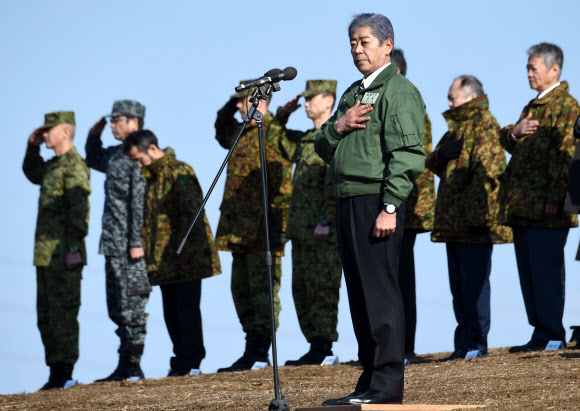 |
|
Takeshi Ishikawa, director of the Japanese Ministry of Defense bureau of defense policy, during a military ceremony at Narashino Base on Jan. 13. (Yonhap News).
|
Japan fails to share radio frequency data in Singapore meeting
South Korean and Japanese military authorities held working-level talks in Singapore on Jan. 14 to discuss approaches to resolving the two sides’ conflict over a Japanese patrol aircraft’s threatening low-altitude flyby and a South Korean warship’s use of targeting radar against it. Contrary to expectations, the Japanese side did not share frequency data to support its claims, sources reported. The South Korea-Japan talks that day were held at the South Korean embassy in the morning and the Japanese embassy in the afternoon to discuss matters concerning the patrol aircraft. The talks reportedly concluded around 8:30 pm. “We explained in detail about the facts and our side’s position regarding the main issues including the low-altitude flyby, thereby increasing the other side’s understanding,” the South Korean Ministry of National Defense (MND) said. While many had been watching to see if Japan would share radar frequency data it claimed the patrol aircraft had intercepted, the Japanese military authorities reportedly did not share the key frequency evidence to support their claims. The meeting on Jan. 14 was attended by MND officials and general-level officers on both sides. On the South Korean side, Navy Vice Admiral and Joint Chiefs of Staff Military Support Headquarters Chief Bu Seok-jong and Ministry of National Defense Director General for International Policy Lee Won-ik attended as representatives. The representatives on the Japanese side were Atsushi Hikita, a Japan Air Self-Defense Force lieutenant general and Joint Staff Office director of operations, and Takeshi Ishikawa, director of the Japanese Ministry of Defense bureau of defense policy. The decision to hold working-level talks in a third country to resolve the conflict between South Korea and Japan is seen as unusual. As a neutral state with embassies of both countries, Singapore was reportedly chosen as a venue in reflection of distance and time difference issues. An MND official explained, “We took into account concerns that it might be disadvantageous for the other side if [the talks] were held in South Korea or Japan.” The question of whether [Japan] would share information on radar intercepted by the Japanese patrol aircraft from the South Korean vessel was expected to be a major issue at the talks. The South Korean side has repeatedly demanded that the radar information be shared, while Japan has declined to do so citing military secrecy. Japan’s NHK network reported Japan’s response plan on Jan. 14 as potentially including the release of Japan Maritime Self-Defense Force radio wave data. South Korea and Japan previously held working-level talks in a conference call format on Dec. 27, but were unable to bridge their differences. The situation subsequently escalated into a campaign on both sides targeting international opinion, with the Japanese Ministry of Defense releasing footage taken by the patrol aircraft and the South Korean Ministry of National Defense providing its own footage to contradict Japan’s claims. By Yoo Kang-moon, senior staff writer Please direct comments or questions to [english@hani.co.kr]






